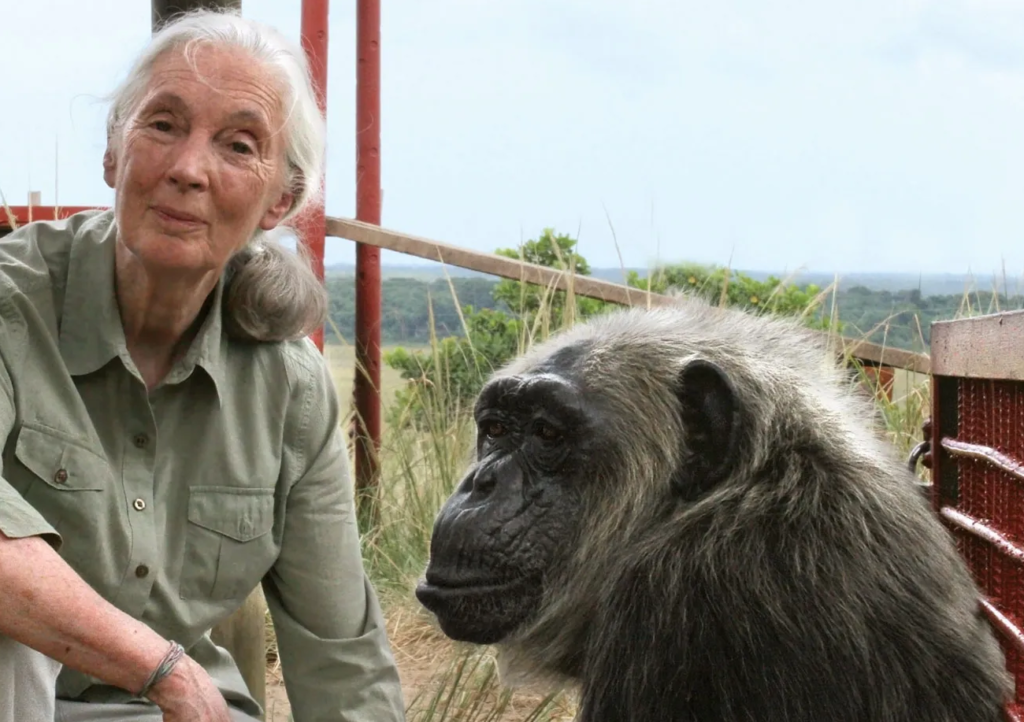Introduction
Jane Goodall is one of the most influential figures in the field of primatology and a passionate advocate for wildlife conservation. Her groundbreaking research on chimpanzees has not only transformed scientific understanding but has also inspired global movements for animal welfare and environmental sustainability.
Early Life and Inspiration
Born on April 3, 1934, in London, England, Goodall’s fascination with animals began early in her childhood. Encouraged by her parents, especially her father, she developed a love for reading and nature. After graduating high school, Goodall worked briefly as a secretary, but her dream of studying wildlife in Africa persisted. In 1957, she traveled to Kenya, where she met the renowned anthropologist Dr. Louis Leakey, who recognized her potential and invited her to study chimpanzees in Gombe Stream National Park.

Jane Goodall
Revolutionary Research
In 1960, at just 26 years old, Goodall began her groundbreaking field study of chimpanzees in Tanzania. Her meticulous observations over the years revealed astonishing behaviors, including tool-making—a trait once thought to be unique to humans. She documented complex social interactions, emotional bonds, and cultural behaviors among the chimpanzees, significantly changing the scientific narrative about our closest relatives.
Goodall’s findings were published in her seminal book, In the Shadow of Man, which brought her international acclaim. Her work challenged the long-held belief that humans were separate from the animal kingdom, highlighting the emotional and social complexities of chimpanzees.
Advocacy and Conservation Efforts
Recognizing the threats faced by chimpanzees and their habitats, Goodall became a vocal advocate for conservation. In 1977, she founded the Jane Goodall Institute, which focuses on wildlife research, community-centered conservation, and environmental education. One of her most impactful initiatives, the “Roots & Shoots” program, empowers young people to engage in conservation efforts and address environmental challenges in their communities.
Goodall’s advocacy extends beyond chimpanzees. She emphasizes the interconnectedness of all living beings and the need for sustainable practices to protect our planet. Through her speeches, writings, and documentaries, she inspires millions to take action for the environment and animal welfare.
Legacy and Continued Impact
Jane Goodall’s work has garnered numerous accolades, including the United Nations Messenger of Peace designation. She continues to travel the world, sharing her message of hope and urging individuals to make a difference. Her life’s work serves as a reminder of the power of observation, empathy, and activism in the face of global challenges.
As we confront pressing issues such as climate change and habitat destruction, Goodall’s insights remain more relevant than ever. Her unwavering belief in the potential of individuals to effect change inspires new generations to care for the planet and its inhabitants.
Conclusion
Jane Goodall’s remarkable journey from a curious young girl in London to a leading figure in primatology and conservation is a testament to her passion and dedication. Her groundbreaking research and advocacy have not only advanced scientific understanding but have also sparked a global movement for compassion and sustainability. In a world facing unprecedented environmental challenges, Goodall’s legacy serves as a beacon of hope, urging us all to take responsibility for our planet.
